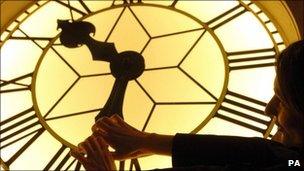Clocks change bill runs out of time in Commons
- Published

Supporters say lighter evenings would reduce traffic fatalities and boost exercise
A bid to move the UK's clocks forward by an hour for a three-year trial period has failed after the legislation ran out of time in the Commons.
The Daylight Savings Bill, external would have seen the UK adopt Central European Time, with BST plus one hour in summer and GMT plus one in winter.
But determined opposition from MPs meant it failed to make progress within the time limit for debate.
Many of the objections focused on the impact of a change on road accidents.
Conservative MP Rebecca Harris's private member's bill, if adopted, would have meant that for one autumn, the clocks would not go back, synchronising the UK with much of Europe and meaning that British Summer Time (BST) would effectively continue throughout the winter.
The following spring the clocks would go forward to BST plus one hour, or two hours ahead of Greenwich Mean Time (GMT) - something which has been called "double summertime".
Outdoor workers
Ms Harris - and other advocates - cite a range of advantages to lighter evenings, including promoting sports and tourism, and reducing energy consumption.
But for years the case in favour of change has struggled because of opposition in Scotland and northern England where it would leave some of the northern-most areas without daylight until 10am during the winter months.
Critics say this would make the lives of outdoor workers harder and increase road accidents due to the darker mornings - although those in favour of a change argue it would reduce accidents in the evenings.
The bill faced determined opposition from a group of MPs, principally Conservative and Scottish National Party, who were determined to stop it. After tabling many amendments, they spoke at length in support of them, ensuring the bill ran out of time.
While it is not yet killed off, any future progress would likely depend on ministers deciding to give it support.
'False division'
Conservative MP Christopher Chope said the bill's "Achilles' heel" was that it proposed a trial, despite Scottish opposition.
"My concern is that if Parliament changes the time zone for the United Kingdom against the wishes of the people in Scotland that is going to give extra ammunition to those people in Scotland who are campaigning for an independent Scotland," he said.
He also said: "I think we're in danger of embarking on a course that's going to waste an enormous amount of public money and time of government."
The SNP's Angus MacNeil said the bulk of Scottish opinion was against a change and "if there is any perception of high-handedness from Westminster we will probably see last week's figure of 1,000 new members for the SNP being dwarfed".
But Labour MP Tom Harris backed a trial, adding: "It is ridiculous and very dangerous to conjure up some kind of false division, some false sense of grievance.
"This isn't about Scotland versus England, this is about looking at the evidence for a case for improving the lives of people throughout our nation."
Parliament's 'duty'
Business Minister Edward Davey said the government would consult with the Welsh and Scottish governments over any proposed trial and would not expect to proceed if there was clear opposition.
Many other MPs also argued in favour of passing the bill to allow a trial.
Conservative Bob Stewart said it was Parliament's "duty" to investigate any possible move that could reduce road deaths and injuries.
Lib Dem John Leech said the evidence suggested that more accidents happen in the evenings that the mornings, so a change that could make a difference in the evenings was worth looking at.
But the SNP's Eilidh Whiteford said: "Road accidents are far less to do with the amount of daylight than other factors - the way people drive and the weather conditions, for example."
The clocks were moved forward by an hour during World War II to maximise productivity at munitions factories and ensure people got home safely before the blackout.
From 1968 to 1971, a trial was held which saw BST employed all year round, and during that time Northern Scotland saw a net increase in the number of people killed or seriously injured on the roads.
A White Paper said it was impossible to quantify the advantages and disadvantages of the time change and so any prospect of continuing it was abandoned.
- Published28 October 2011
- Published28 October 2011
- Published18 January 2012